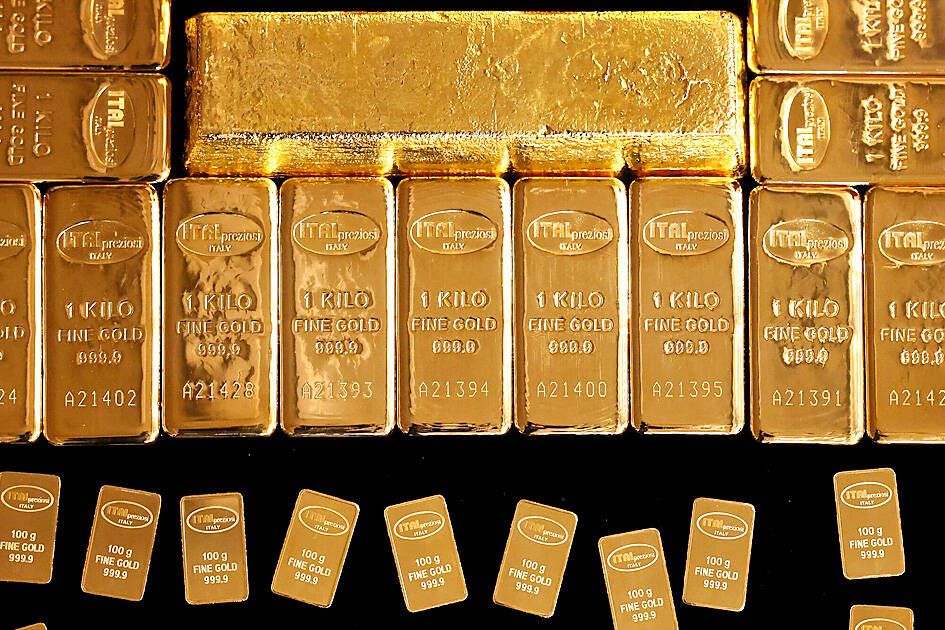A record share of the world’s central banks plans to accumulate more gold over the next 12 months, drawn by bullion’s performance during times of crisis and protection against inflation.
In a survey of 72 monetary authorities, 43 percent said they expected their gold reserves to increase, up from 29 percent a year earlier and the highest figure in eight years of data collected by the World Gold Council (WGC) and YouGov. None anticipated a decline.
Central banks have been one of the most important drivers of a long-running gold rally that has seen prices double since late 2022. The pace of buying doubled after Russia’s invasion of Ukraine in February 2022, when the freezing of much of Russia’s foreign currency holdings highlighted the appeal of bullion as a reserve asset.

Photo: Bloomberg
“There are some pretty big moves in some of these numbers,” said Shaokai Fan (范少凱), global head of central banks for the WGC, a trade body representing gold miners. “Western countries have stopped selling and emerging market countries have started buying, they’re catching up and building more gold reserves.”
The overwhelming majority of respondents said they thought central bank gold reserves would increase globally over the next 12 months, with the most commonly cited factors being its performance during crises, its role as a portfolio diversifier and a store of value.
Central banks have been mopping up more than 1,000 tonnes for each of the last three years, and are set to continue that pace of buying this year, consultancy Metals Focus said.
They have been net buyers for the last 15 years, reversing net sales that drove a decade-long bear market in the 1990s.
The buying helped gold overtake the euro as the second-largest asset in the reserves of the world’s central banks late last year. US dollar assets, mostly Treasuries, extended a steady decline to reach 46 percent of global reserves.
Among the factors that threaten to accelerate the decline of the US dollar’s share of global reserves are the country’s yawning fiscal deficits, confiscation risk and speculation that foreign creditors might be treated less favorably.
All that stands to benefit gold. More than half of the central banks from emerging economies in the survey said that gold’s lack of political risk was a relevant factor behind their decision to hold gold, while 78 percent cited its lack of default risk.
However, the US dollar is not in danger of losing its status as the dominant reserve asset anytime soon.
“Central banks are looking at the dollar and the Treasury market with a little bit more care than they would earlier on, but I don’t think that this is a sort of mad rush for the doors,” Fan said.

In Italy’s storied gold-making hubs, jewelers are reworking their designs to trim gold content as they race to blunt the effect of record prices and appeal to shoppers watching their budgets. Gold prices hit a record high on Thursday, surging near US$5,600 an ounce, more than double a year ago as geopolitical concerns and jitters over trade pushed investors toward the safe-haven asset. The rally is putting undue pressure on small artisans as they face mounting demands from customers, including international brands, to produce cheaper items, from signature pieces to wedding rings, according to interviews with four independent jewelers in Italy’s main

Japanese Prime Minister Sanae Takaichi has talked up the benefits of a weaker yen in a campaign speech, adopting a tone at odds with her finance ministry, which has refused to rule out any options to counter excessive foreign exchange volatility. Takaichi later softened her stance, saying she did not have a preference for the yen’s direction. “People say the weak yen is bad right now, but for export industries, it’s a major opportunity,” Takaichi said on Saturday at a rally for Liberal Democratic Party candidate Daishiro Yamagiwa in Kanagawa Prefecture ahead of a snap election on Sunday. “Whether it’s selling food or

CONCERNS: Tech companies investing in AI businesses that purchase their products have raised questions among investors that they are artificially propping up demand Nvidia Corp chief executive officer Jensen Huang (黃仁勳) on Saturday said that the company would be participating in OpenAI’s latest funding round, describing it as potentially “the largest investment we’ve ever made.” “We will invest a great deal of money,” Huang told reporters while visiting Taipei. “I believe in OpenAI. The work that they do is incredible. They’re one of the most consequential companies of our time.” Huang did not say exactly how much Nvidia might contribute, but described the investment as “huge.” “Let Sam announce how much he’s going to raise — it’s for him to decide,” Huang said, referring to OpenAI

The global server market is expected to grow 12.8 percent annually this year, with artificial intelligence (AI) servers projected to account for 16.5 percent, driven by continued investment in AI infrastructure by major cloud service providers (CSPs), market researcher TrendForce Corp (集邦科技) said yesterday. Global AI server shipments this year are expected to increase 28 percent year-on-year to more than 2.7 million units, driven by sustained demand from CSPs and government sovereign cloud projects, TrendForce analyst Frank Kung (龔明德) told the Taipei Times. Demand for GPU-based AI servers, including Nvidia Corp’s GB and Vera Rubin rack systems, is expected to remain high,